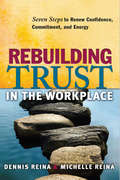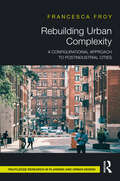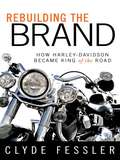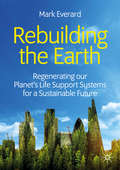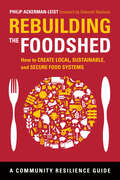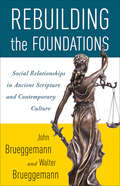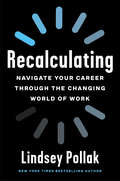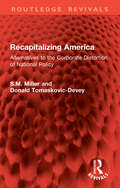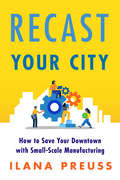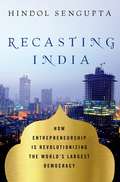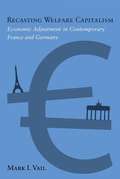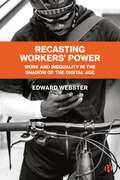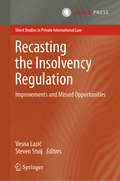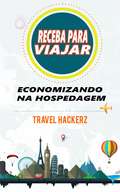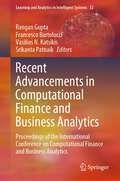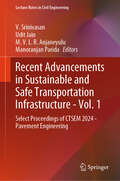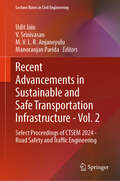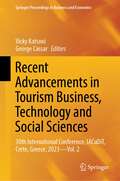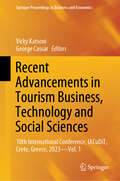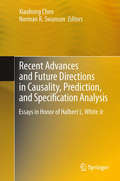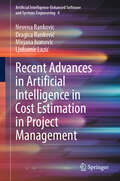- Table View
- List View
Rebuilding Trust in the Workplace: Seven Steps to Renew Confidence, Commitment, and Energy
by Dennis S. Reina Michelle L. ReinaAre you feeling less engaged, less committed and more skeptical at work? Do you find yourself isolated? Or are you caught in the middle of co-workers’ interpersonal conflicts? If so, you may be experiencing the symptoms of broken trust in workplace relationships. Small but hurtful situations accumulate over time into the confidence-busting, commitment-breaking, energy-draining patterns consistent with broken trust. Broken trust is simply the natural outcome of people interacting with one another. Everyone has experienced gossiping, missed deadlines, someone taking credit for other people’s work and “little white lies.” You may have been hurt. You may have realized that you inadvertently let others down. Or, you may be wondering how to help others reeling from broken trust. No matter your vantage point, Dennis Reina and Michelle Reina’s new book offers a proven seven-step process to heal pain and rebuild trust. This compassionate, practical approach will help you reframe the experience, take responsibility, forgive, let go and move on. Through healing, you will want to go to work again. You will feel safe to be more fully “who” you are and, once again give your organization your best thinking, highest intention, risk-taking and creativity. And in a place of self-discovery, self-trust and authenticity, you will connect more fully with others in your personal life as well. While there have been many books on recovering from betrayal in personal relationships, this is the first book to focus specifically on the workplace, and the first to give equal weight to what to do when you have hurt others. It is firmly grounded in the Reinas’ 20 years of rigorous research on trust and the empathy they have developed from supporting thousands of people on their healing journeys.
Rebuilding Urban Complexity: A Configurational Approach to Postindustrial Cities (Routledge Research in Planning and Urban Design)
by Francesca FroyThis is a book about urban complexity – how it evolves and how it gets destroyed. It explores the structures of interdependency which underpin cities, where the many different “parts” (people, streets, industry sectors) interact to form an evolving “whole”.The book explores the evolution and destruction of complexity in one city – Greater Manchester – but also other post-industrial cities, including Sheffield and Newcastle, Detroit and New Haven. The focus is on the networked qualities of public urban space, and how street networks work as multiscale systems. The book also explores economic networks, and the evolving sets of interconnecting economic capabilities which help to shape urban economies. It demonstrates how cities evolve through processes of self-organisation – and concludes by considering how policy makers can best harness such processes as they rebuild urban complexity following insensitive planning interventions in the 1960s and 1970s.The book will appeal to anybody with an interest in cities, and how they work. It is interdisciplinary in scope, weaving in strands from architecture, economics, history, anthropology and ecology. It is written for academics but also non-academics, including urban planners, architects, local economic development actors and other policy makers.
Rebuilding a Community: Father Vien The Nguyen
by Ranjay Gulati Caroline De Lacvivier David L. TannenwaldCase
Rebuilding the Brand: How Harley-Davidson Became King of the Road
by Clyde FesslerIn the early 1980s, Harley-Davidson was on the verge of bankruptcy. In the general public's opinion, quality was substandard-of both motorcycles and riders. Harleys leaked oil and were often broken down. Riders were roughnecks, out to raise hell. The Harley-Davidson brand was tarnished. What s more, the charges were true.By the mid-1980s, Harley couldn't produce enough bikes to keep the public happy. Dealers were selling bikes off the showroom floor, struggling to assuage customers frustration. And today, Harley-Davidson is a model brand. Harley-Davidson isn't just a motorcycle company anymore. It is a community, a look, a source of self-expression, an all-American appeal for freedom-all expressed in one little logo.So, what happened? How did Harley manage to pull itself from the fire, brush itself off, and ride off into the sunset? The secret: branding. Histories will tell you how Harley-Davidson closed the quality gap between Hogs and the cheaper, faster, sleeker Japanese bikes; how Harley used Japanese manufacturing methods to increase its cash flow; how Harley clawed its way back from the brink of bankruptcy. All these aspects were important to Harley s rise from the ashes, no doubt, and as such are discussed in this book. But the true power of the big, beautiful, orange and black machine that is Harley-Davidson lies in its image, the Bar and Shield, the brand.Rebuilding the Brand: How Harley-Davidson Became King of the Road is the story of how a core group led a team of not only marketing folks but also employees, management, dealers, and vendors to rebuild the Harley-Davidson image. Told through the perspective of Clyde Fessler-who held several positions within Harley, from head of marketing services to VP of business development-Rebuilding the Brand provides dynamic branding information couched in an entertaining story. Fessler describes the methods used to create the iconic image Harley-Davidson enjoys today, methods that can be translated to nearly any industry, and explores the topics of brand experience, brand personality, brand extension, brand association, brand consistency, and brand welfare.
Rebuilding the Earth: Regenerating our planet’s life support systems for a sustainable future
by Mark EverardRebuilding the Earth highlights humanity’s interdependence with the planet’s ecosystems. Today, these ecosystems are seriously degraded, compromising future security and opportunity. It is essential that we set about rebuilding the metaphorical ‘ark’ of nature upon which our future prospects depend. Central to this book are several case studies of regenerative approaches drawn from every continent on the planet. These approaches are founded on restoration and protection of ecosystems – water and soil, forests, marine and coastal resources, urban infrastructure, farming practices and in corporate supply chains. Rebuilding the Earth is above all optimistic about the daunting challenges facing global society. It is about culture change, addressing the necessity of and the means for putting nature and people back into the heart of societal thinking, policy and action. It advocates for sustainable development in its deepest green sense, but also pragmatically framed in social, technological, governance and economic contexts. The concluding message is “Yes, we can!”
Rebuilding the Foodshed: How to Create Local, Sustainable, and Secure Food Systems
by Philip Ackerman-LeistDroves of people have turned to local food as a way to retreat from our broken industrial food system. From rural outposts to city streets, they are sowing, growing, selling, and eating food produced close to home—and they are crying out for agricultural reform. All this has made "local food" into everything from a movement buzzword to the newest darling of food trendsters.But now it's time to take the conversation to the next level. That's exactly what Philip Ackerman-Leist does in Rebuilding the Foodshed, in which he refocuses the local-food lens on the broad issue of rebuilding regional food systems that can replace the destructive aspects of industrial agriculture, meet food demands affordably and sustainably, and be resilient enough to endure potentially rough times ahead.Changing our foodscapes raises a host of questions. How far away is local? How do you decide the size and geography of a regional foodshed? How do you tackle tough issues that plague food systems large and small—issues like inefficient transportation, high energy demands, and rampant food waste? How do you grow what you need with minimum environmental impact? And how do you create a foodshed that's resilient enough if fuel grows scarce, weather gets more severe, and traditional supply chains are hampered?Showcasing some of the most promising, replicable models for growing, processing, and distributing sustainably grown food, this book points the reader toward the next stages of the food revolution. It also covers the full landscape of the burgeoning local-food movement, from rural to suburban to urban, and from backyard gardens to large-scale food enterprises.
Rebuilding the Foundations: Social Relationships In Ancient Scripture And Contemporary Culture
by Walter Brueggemann John BrueggemannIn this unique volume, father-and-son team Walter and John Brueggemann take a close look at our fractured American society and suggest ways for improvement. Using six themes identified by some scholars as the moral foundations of society—care, fairness, liberty, loyalty, authority, and sanctity—they examine the unsustainable patterns of our contemporary society and reveal how those patterns played out in the ancient world of the Old Testament. Brueggemann and Brueggemann demonstrate how comparing the current state of these moral foundations with what God wanted them to be can help us better respond to the challenges of today. They assert that achieving any significant change will require the work of all of us and will be grounded in a vision of neighborliness. Rebuilding the Foundations will inspire readers to reorient toward a better way of living, both for themselves and for all living things.
Recalculating: Navigate Your Career Through the Changing World of Work
by Lindsey PollakA leading workplace expert provides an inspirational, practical, and forward-looking career playbook for recent grads, career changers, and transitioning professionals looking to thrive in today’s rapidly evolving workplace.Covid-19 has heightened career uncertainty in a work landscape dominated by turbulence and change, and it is directly impacting how people are entering—or re-entering—the workplace. But as Lindsey Pollak makes clear, the pandemic merely accelerated career and hiring trends that have been building. Changes that were once slowly spreading have been rapidly implemented across all industries. This means that the old job hunting and career success rules no longer apply. Job seekers of all generations and skill sets must learn how to thrive in this “new normal,” which will include a hybrid of remote and in-person experiences, increased reliance on virtual communication and automation, constant disruption, and renewed employer emphasis on workers’ health and well-being.While this new world is complicated and constantly evolving, you won’t have to navigate it alone. For twenty years, Pollak has been following the trends and successfully advising young professionals and organizations on workplace success. Now, she guides you through the changes currently happening—and those to come. Combining insights from both experts and professionals across generations, she provides encouraging, strategic, and actionable advice on making lifelong decisions about education; building a resilient personal brand; using virtual communication to remotely interview, network, and work; skilling and reskilling for the future; and maintaining self-care and mental health.Like your personal GPS, Pollak equips you to handle workplace obstacles, helping you see them as challenges to navigate rather than impossible roadblocks. There is no perfect path to a dream career, but with Recalculating you’ll be prepared with the necessary skills and tools to succeed.
Recapitalizing America: Alternatives to the Corporate Distortion of National Policy (Routledge Revivals)
by S.M. Miller Donald Tomaskovic-DeveyFirst published in 1983, Recapitalizing America (now with a new preface by Donald Tomaskovic-Devey) identifies, criticizes, and offers alternatives to the accepted wisdoms of recapitalization, whose variants include not only Reaganomics and Thatcherism but also the less rigid neo-liberal and even liberal policy proposals likely to supplant them. The authors do not want simply to restore the Keynesian welfare state liberalism of the past, but to change and build beyond it.If the economic ideology of pro-business recapitalization is productivity, the social ideology is the deliberate widening of inequalities and the legitimation of the inegalitarian trends. In opposition to this erosion of support for greater equality, Miller and Tomaskovic-Devey first expose the faulty economic analysis of recapitalization and then propose an alternative economics and politics which are grounded in a commitment to social justice. More specifically, they argue that high-technology jobs cannot solve the problem of unemployment, that the U.S. does not suffer from low investment but from the inappropriate use of capital funds, and that higher productivity is no panacea for the complex problems of the American economy. Their prescriptions include a more effective allocation of capital coupled with a realistic assessment of the difficulties faced by democratic planning, advocacy of employment as the social policy, and the recognition that a more caring society depends not only on legislation and administration but more fundamentally on the concern of one citizen for another.
Recast Your City: How to Save Your Downtown with Small-Scale Manufacturing
by Ilana PreussIn Recast Your City: How to Save Your Downtown with Small-Scale Manufacturing, community development expert Ilana Preuss explains how local leaders can revitalize their downtowns or neighborhood main streets by bringing in and supporting small-scale manufacturing. Small-scale manufacturing businesses help create thriving places, with local business ownership opportunities and well-paying jobs that other business types can't fulfill.Preuss draws from her experience working with local governments, large and small, from Knoxville, Tennessee, to Columbia, Missouri, to Fremont, California. She provides tools, such as her five-step method for recasting your city, that local leaders in government, business, and real estate as well as entrepreneurs and advocates in every community can use.
Recasting India
by Hindol SenguptaTwenty years after India opened its economy, it faces severe economic problems, including staggering income inequality. A third of its citizens still lack adequate food, education, and basic medical services, while Mumbai businessman Mukesh Ambani lives in the most expensive home in the world, which cost over a billion dollars to build. Despite the fact that India now has a Mars mission, there are still more mobile phones than toilets in the country. In most places, such a disparity would have the locals pounding at the gates. So why no Arab Spring for India? Hindol Sengupta, senior editor of Fortune India, argues that the only thing holding it back is the explosion of local entrepreneurship across the country. While these operations are a far cry from the giant companies owned by India's ruling billionaires, they are drastically changing its politics, upending the old caste system, and creating a "middle India" full of unprecedented opportunity. Like Gazalla Amin whose flourishing horticulture business in the heart of Kashmir has given her the title 'lavender queen.' Or Sunil Zode, who stole the first shoes he ever wore and now drives a Mercedes, thanks to his thriving pesticide business. Sengupta shows that the true potential of India is even larger than the world perceives, since the economic miracle unfolding in its small towns and villages is not reflected in its stock markets. Recasting India reveals an India rarely seen by the larger world--the millions of ordinary, enterprising people who are redefining the world's largest democracy.
Recasting Welfare Capitalism: Economic Adjustment in Contemporary France and Germany
by Mark I. VailCompares and contrasts the development of welfare capitalism in France and Germany, through good times and bad, since the 1970s
Recasting Workers' Power: Work and Inequality in the Shadow of the Digital Age
by Edward Webster Lynford DorMuch of the debate on the future of work has focused on responses to technological trends in the Global North, with little evidence on how these trends are impacting work and workers in the Global South. Drawing on a rich selection of ethnographic studies of precarious work in Africa, this innovative book discusses how globalisation and digitalisation are drivers for structural change and examines their implications for labour. Bringing together global labour studies and inequality studies, it explores the role of digital technology in new business models, and ways in which digitalisation can be harnessed for counter mobilisation by the new worker.
Recasting the Insolvency Regulation: Improvements and Missed Opportunities (Short Studies in Private International Law)
by Vesna Lazić Steven StuijThis book comprises contributions relating to the Insolvency Regulation Recast,which recently entered into force. The authors analyse the changes introduced andgive their views on the improvements that are thereby achieved. In other words, theyassess to what extent the amendments have mitigated the disadvantages of the previousInsolvency Regulation.Three of the chapters concentrate on the issues pertaining to jurisdiction, such asthe problem of forum shopping by re-locating the debtor’s centre of main interests.Furthermore, the extent to which the parties have the freedom to contract withinthe framework of the Insolvency Regulation Recast is discussed. Also, the relevanceand consequences of recent developments in corporate law for the current crossborderinsolvency framework, as well as the jurisdictional issues concerning approvalrequirements are amongst the matters addressed. Aside from the jurisdictional matters,the question of the law applicable to so-called ‘avoidance actions’ is analysed and crossbordercooperation between national authorities in the field of insolvency is touchedupon. To conclude, this book covers a range of specific and intriguing topics broughtup by the Insolvency Regulations Recast.This third volume in the Short Studies in Private International Law Series is primarilyaimed at legal academics dealing with cross-border insolvency, but it will also proveuseful to insolvency judges and practitioners, as well as those specialised in financialand fiscal law. Finally, advanced students as well as those with a general interest ininsolvency law will also find it of added value.Vesna Lazić is Senior Researcher at the T.M.C. Asser Institute and Associate Professorof Private Law at Utrecht University in The Netherlands. Steven Stuij is an expert inprivate international law and PhD Candidate at the Erasmus School of Law, Rotterdam.
Recasting the Role of the CEO: Transferring the Responsibility for Change-How Leaders Can Tap the Creative Energy of Employees
by Vineet NayarEveryone agrees that leadership is fundamental to a company, yet its role is difficult to define in companies that compete in a knowledge economy. According to Vineet Nayar, CEO of HCL Technologies, a leading global IT services company, the greatest impact of the "employees first, customers second" approach to management is that it unleashes the power of those working in what he calls the value zone-where direct interaction with customers actually creates customer value-and lessens the inhibiting effect of those in top-level positions, thus increasing the speed and quality of innovation and decision making. In fact, according to Nayar, if you are a leader who wants to create sustainable change and prevent your company from periodically falling out of the race, you must stop thinking of yourself and your leadership team as the only source of new ideas. Instead, you must begin to transfer ownership of your company's growth to the next generation of leaders who are closer to the value zone. Only then can you create a company in which employees feel like owners, are excited by their work, and focus every day on change and innovation. This chapter was originally published as Chapter 4 of "Employees First, Customers Second: Turning Conventional Management Upside Down."
Receba para viajar: economizando na hospedagem (corte de gastos, segredos, dicas, guia, orçamentos)
by Gabriela Morandini Travel HackerzUma Leitura Fácil e Informativa para Virar o Jogo Contra a Indústria de Hospedagem de Tempo Compatilhado Essa indústria de hospedagem vem se aproveitando das pessoas por décadas a fio. É hora de você ter a palavra final e entender como fazer com que trabalhem a seu favor. Nesse guia educativo, você vai aprender os segredos e táticas que essa indústria usa para te separar de seu dinheiro, ganho com muito suor, e encher os bolsos de executivos ambiciosos. Mais importante: você vai aprender como virar o jogo e colocar dinheiro no seu próprio bolso enquanto sorri no caminho até o banco. Neste livro você vai aprender: Como se hospedar de graça em resorts de 5 estrelas exóticos e luxuosos; Como receber mais de 100 dólares por hora quando estiver em uma viagem de férias; Como evitar gastar milhares de dólares em ridículas hospedagens de tempo compartilhado; Como conseguir um cruzeiro romântico ao por do sol; Como coneguir um cruzeiro de 3 dias com todas as despesas pagas; Como receber novas viagens de férias por e-mail, de tempos em tempos, sem precisar mexer um dedo. Este livro livro vai te ajudar a economizar milhares de dólares em gastos de viagem desnecessários. Ele contém conselhos práticos, úteis e possíveis de serem feitos, que irão ajudar a qualquer um e a todos que um dia desejaram colocar os pés em um resort de 5 estrelas pelo mundo. Faça um favor a si mesmo e à sua família ao ler este livro e descobrir como você pode viajar de graça, como se fosse um astro do Rock.
Recent Advancements in Computational Finance and Business Analytics: Proceedings of the International Conference on Computational Finance and Business Analytics (Learning and Analytics in Intelligent Systems #32)
by Srikanta Patnaik Francesco Bartolucci Rangan Gupta Vasilios N. KatsikisRecent Advancements of Computational Finance and Business Analytics provide a comprehensive overview of the cutting-edge advancements in this dynamic field. By embracing computational finance and business analytics, organizations can gain a competitive edge in an increasingly data-driven and complex business environment.This book has explored the latest developments and breakthroughs in this rapidly evolving domain, providing a comprehensive overview of the current state of computational finance and business analytics. It covers the following dimensions of this domains:Business AnalyticsFinancial AnalyticsHuman Resource AnalyticsMarketing Analytics
Recent Advancements in Sustainable and Safe Transportation Infrastructure - Vol. 1: Select Proceedings of CTSEM 2024 - Pavement Engineering (Lecture Notes in Civil Engineering #621)
by V. Srinivasan Manoranjan Parida M. V. L. R. Anjaneyulu Udit JainThis book presents select proceedings of the 10th Conference on Transportation Systems Engineering and Management (CTSEM 2024). It focuses primarily on transport planning, traffic engineering, pavement technology, and sustainable construction practices. It sheds light on cutting-edge research in intelligent transportation systems like Internet of Things (IoT) devices, smart data collection techniques, smart city applications, connected vehicles and autonomous vehicles. The book also delves into the use of waste and recyclable materials and suitable design formulations for the development of resilient and sustainable infrastructure. This book is a valuable reference for researchers and professionals interested in transportation systems engineering and allied fields.
Recent Advancements in Sustainable and Safe Transportation Infrastructure - Vol. 2: Select Proceedings of CTSEM 2024 - Road Safety and Traffic Engineering (Lecture Notes in Civil Engineering #622)
by V. Srinivasan Manoranjan Parida M. V. L. R. Anjaneyulu Udit JainThis book presents select proceedings of the 10th Conference on Transportation Systems Engineering and Management (CTSEM 2024). It focuses primarily on transport planning, traffic engineering, pavement technology, and sustainable construction practices. It sheds light on cutting-edge research in intelligent transportation systems like Internet of Things (IoT) devices, smart data collection techniques, smart city applications, connected vehicles and autonomous vehicles. The book also delves into the use of waste and recyclable materials and suitable design formulations for the development of resilient and sustainable infrastructure. This book is a valuable reference for researchers and professionals interested in transportation systems engineering and allied fields.
Recent Advancements in Tourism Business, Technology and Social Sciences: 10th International Conference, IACuDiT, Crete, Greece, 2023 - Vol. 2 (Springer Proceedings in Business and Economics)
by Vicky Katsoni George CassarThe book features the second volume of the proceedings of the 10th International Conference of the International Association of Cultural and Digital Tourism (IACuDiT), with the theme “Recent Advancements in Tourism Business, Technology, and Social Sciences,” which was held from August 29 to 31, 2023, in Crete, Greece. It showcases the latest research on Tourism Business, Technology, and Social Sciences and presents a critical academic discourse on smart and sustainable practices in the tourism industry, stimulating future debates and advancing readers’ knowledge and understanding of this critical area of tourism business in the post-COVID-19 era. COVID-19 produced dramatic effects on the global economy, business activities, and people, with tourism being particularly affected. The book discusses the resulting digital transformation process in a range of areas, including its effect on the social sciences combined with special forms of tourism. This accelerated digitalizationencourages the emergence of new digital products and services based on the principle of flexibility. The book focuses on the knowledge economy and smart destinations, as well as new modes of tourism management and development, and includes chapters on emerging technologies such as the Internet of Things, artificial intelligence, big data, and robotics in connection with various tourism practices.
Recent Advancements in Tourism Business, Technology and Social Sciences: 10th International Conference, IACuDiT, Crete, Greece, 2023—Vol. 1 (Springer Proceedings in Business and Economics)
by Vicky Katsoni George CassarThe book features the first volume of the proceedings of the 10th International Conference of the International Association of Cultural and Digital Tourism (IACuDiT), with the theme “Recent Advancements in Tourism Business, Technology, and Social Sciences,” which was held from August 29 to 31, 2023, in Crete, Greece. It showcases the latest research on Tourism Business, Technology, and Social Sciences and presents a critical academic discourse on smart and sustainable practices in the tourism industry, stimulating future debates and advancing readers’ knowledge and understanding of this critical area of tourism business in the post-COVID-19 era. COVID-19 produced dramatic effects on the global economy, business activities, and people, with tourism being particularly affected. The book discusses the resulting digital transformation process in a range of areas, including its effect on the social sciences combined with special forms of tourism. This accelerated digitalization encourages the emergence of new digital products and services based on the principle of flexibility. The book focuses on the knowledge economy and smart destinations, as well as new modes of tourism management and development, and includes chapters on emerging technologies such as the Internet of Things, artificial intelligence, big data, and robotics in connection with various tourism practices.
Recent Advances and Future Directions in Causality, Prediction, and Specification Analysis
by Norman R. Swanson Xiaohong ChenThis book is a collection of articles that present the most recent cutting edge results on specification and estimation of economic models written by a number of the world's foremost leaders in the fields of theoretical and methodological econometrics. Recent advances in asymptotic approximation theory, including the use of higher order asymptotics for things like estimator bias correction, and the use of various expansion and other theoretical tools for the development of bootstrap techniques designed for implementation when carrying out inference are at the forefront of theoretical development in the field of econometrics. One important feature of these advances in the theory of econometrics is that they are being seamlessly and almost immediately incorporated into the "empirical toolbox" that applied practitioners use when actually constructing models using data, for the purposes of both prediction and policy analysis and the more theoretically targeted chapters in the book will discuss these developments. Turning now to empirical methodology, chapters on prediction methodology will focus on macroeconomic and financial applications, such as the construction of diffusion index models for forecasting with very large numbers of variables, and the construction of data samples that result in optimal predictive accuracy tests when comparing alternative prediction models. Chapters carefully outline how applied practitioners can correctly implement the latest theoretical refinements in model specification in order to "build" the best models using large-scale and traditional datasets, making the book of interest to a broad readership of economists from theoretical econometricians to applied economic practitioners.
Recent Advances in Agent-Based Negotiation: Applications and Competition Challenges (Studies in Computational Intelligence #1092)
by Takayuki Ito Rafik Hadfi Reyhan Aydoğan Ryuta ArisakaThis book comprises carefully selected and reviewed outcomes of the 13th International Workshop on Automated Negotiations (ACAN) held in Vienna, 2022, in conjunction with International Joint Conference on Artificial Intelligence (IJCAI) 2022. It focuses on the applications and challenges of agent-based negotiation including agreement technology, mechanism design, electronic commerce, recommender systems, supply chain management, social choice theory, and others. This book is intended for the academic and industrial researchers of various communities of autonomous agents and multi-agent systems, as well as graduate students studying in those areas or having interest in them.
Recent Advances in Agent-based Negotiation: Formal Models and Human Aspects (Studies in Computational Intelligence #958)
by Minjie Zhang Takayuki Ito Reyhan Aydoğan Ahmed Moustafa Takanobu OtsukaThis volume comprises carefully selected and reviewed outcomes of the 12th International Workshop on Automated Negotiations (ACAN) held in Macao, 2019, in conjunction with International Joint Conference on Artificial Intelligence (IJCAI) 2019. It focuses on human aspects of automated negotiation and the recent advances in negotiation frameworks and strategies. Written by leading academic and industrial researchers, it is a valuable resource for professionals and scholars working on complex automated negotiations.
Recent Advances in Artificial Intelligence in Cost Estimation in Project Management (Artificial Intelligence-Enhanced Software and Systems Engineering #6)
by Mirjana Ivanovic Nevena Rankovic Dragica Ranković Ljubomir LazićThis book focuses on the practical application of AI tools and techniques in software project management, offering detailed theoretical explanations and practical examples of over 40 state-of-the-art machine learning and deep learning algorithms applied across each project phase, as well as in risk and resource management. Helping the business world estimate projects more accurately while saving costs and resources is crucial in today’s rapidly changing, fast-paced technological landscape. Moreover, it presents specific aspects of combined approaches through ensemble models, incorporating Taguchi’s optimization method to further improve estimation accuracy, advancing this area of software project management. A valuable resource for students and professionals to deepen their knowledge and skills, it also serves as a great manual for companies adopting smarter strategies to manage and develop projects more efficiently and effectively.
